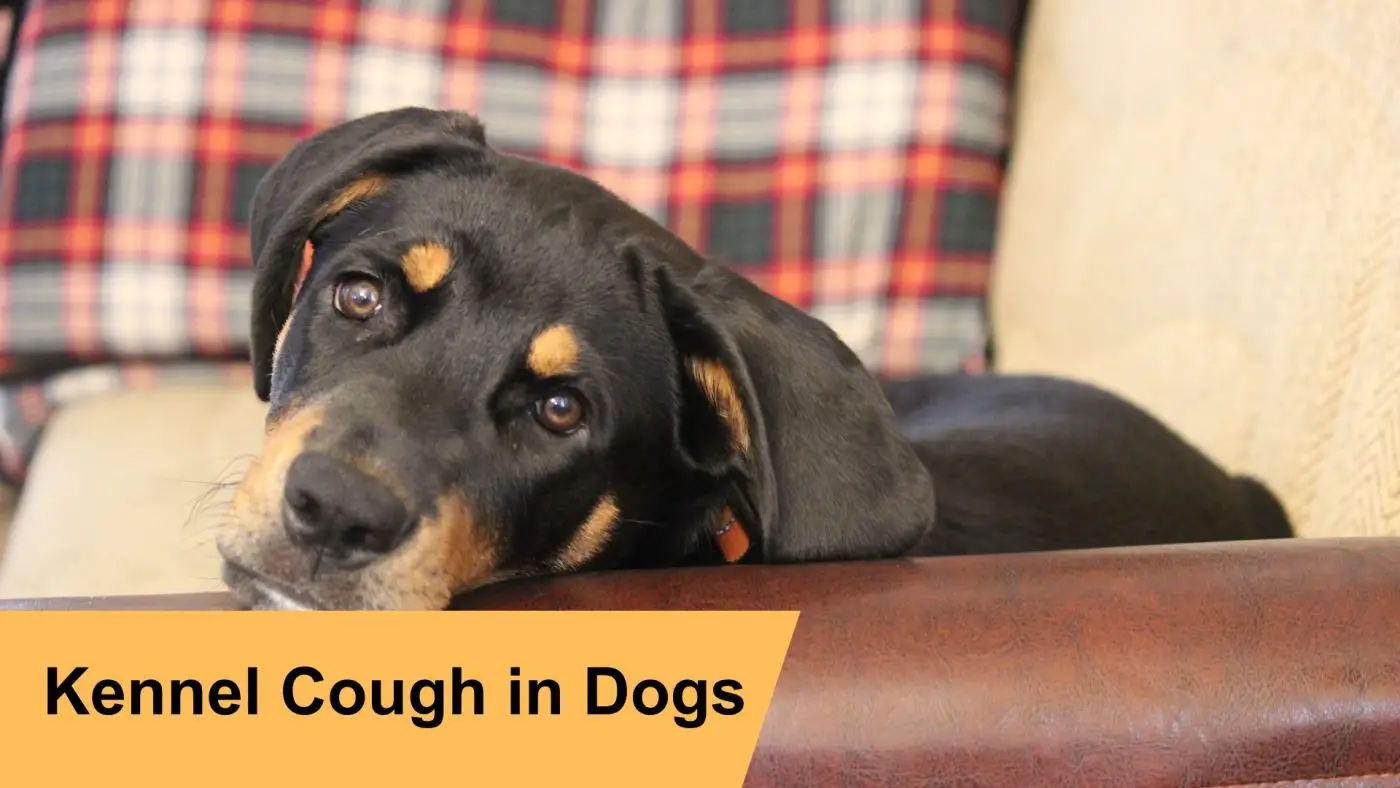You’ve likely heard of kennel cough if you’re a dog owner. Also known as infectious tracheobronchitis, kennel cough is a highly contagious respiratory illness that affects dogs of all ages and breeds.
This infection is caused by a bacteria called Bordetella bronchiseptica, which attacks the lining of a dog’s throat and windpipe, leading to inflammation and irritation. The symptoms of kennel cough in dogs can vary in severity depending on the individual dog’s immune system and overall health.
Some healthy dogs may be asymptomatic carriers of the bacteria and never develop visible symptoms. However, others can experience severe symptoms such as a persistent dry cough, runny nose, fever, sneezing, loss of appetite, lethargy, or difficulty breathing.
What is Kennel Cough?

Kennel cough is a widespread respiratory illness that affects dogs worldwide. It gets its name because it often spreads quickly in crowded environments such as boarding facilities or shelters where many dogs are housed together. This disease’s most common transmission mode is direct contact with an infected dog’s bodily fluids through sneezing or coughing.
Therefore, any dog that comes into close contact with an infected dog has a high risk of contracting kennel cough. It’s important to note that even healthy dogs can rent it if they contact an infected dog.
How long does a kennel cough last?

The typical duration of kennel cough in dogs: Kennel cough is a highly contagious respiratory illness that infects the dog’s throat and lungs. The condition typically lasts 7 to 21 days, but it can sometimes last up to six weeks. The length of time your dog will experience symptoms of kennel cough depends on several factors, including the severity of the infection and your dog’s overall health.
Factors that affect the duration of the illness: Multiple dogs living together in close quarters, such as in a boarding facility or animal shelter, are more likely to spread this illness quickly. Viral infections can also exacerbate symptoms and prolong recovery time.
Geriatric dogs or those with compromised immune systems may have a more challenging time fighting off the virus, leading to a more prolonged recovery period. Not all dogs will experience severe symptoms; some may only have mild symptoms that resolve within a week or two.
In addition to proper treatment and management options, early prevention through vaccination can reduce the severity of kennel cough if your dog is infected. Although not always possible, preventing exposure by avoiding contact with infected dogs can help prevent contracting this disease altogether.
Treatment Options for Kennel Cough
Medications Prescribed by Veterinarians to Treat Kennel Cough

When it comes to treating kennel cough in dogs, veterinarians may prescribe antibiotics to fight off any bacterial infections that may be present. Antibiotics like doxycycline or amoxicillin are commonly used for this purpose. However, it’s important to note that antibiotics cannot cure a viral infection, such as the parainfluenza virus or the canine distemper virus that can cause kennel cough.
In more severe cases where a dog is experiencing high fever, lethargy, or other severe clinical signs of kennel cough, veterinarians may prescribe strong medications like steroids or bronchodilators to help alleviate symptoms. It’s important to follow your vet’s instructions carefully when administering these medications and never give your dog medication meant for humans.
Home Remedies That Can Help Alleviate Symptoms
While medication prescribed by a veterinarian is typically the most effective treatment option for kennel cough in dogs, some home remedies can help alleviate symptoms. In contrast, your dog’s immune system fights off the infection naturally. One option is to use humidifiers at home or run a hot shower and let your dog sit in the steamy bathroom for several minutes throughout the day. This helps soothe irritated airways and reduce coughing fits.
You can also try giving your dog honey mixed with warm water or coconut oil mixed with turmeric powder as a natural remedy that may help boost their immune system and reduce inflammation caused by kennel cough. It’s important to note that home remedies should be used alongside veterinary treatment and not as a substitute.
Pet owners must follow proper prevention measures against infectious viruses such as those causing kennel cough. Being proactive about keeping your dog away from sick dogs, avoiding crowded dog parks, and vaccinating against infectious tracheobronchitis can go a long way in preventing kennel cough in the first place, reducing the need for treatment.
Preventing Kennel Cough
Vaccination as a Preventative Measure

Vaccination is one of the best ways to prevent kennel cough in dogs. Vaccines are essential tools that protect our pets from infectious diseases caused by viruses and bacteria.
Canine adenovirus and Bordetella bacteria are two of the common pathogens that cause kennel cough. Therefore, vaccines against these organisms are highly recommended for all dogs, especially those who frequently interact with other pets.
Vaccines can be administered via injection or intranasally to prevent kennel cough. The nasal vaccine is sprayed into the nostrils, triggering an immune response without causing disease.
Most vaccines require a booster after a few months, followed by annual boosters to maintain immunity. Talk to your veterinarian about the appropriate vaccine protocol for your dog based on their risk factors and lifestyle.
Tips for Reducing the Risk of Your Dog Getting Infected
In addition to vaccination, you can take other practical steps to reduce your dog’s risk of getting infected with kennel cough. One such measure is avoiding contact with infected dogs or environments where they have been recently present. If you have multiple dogs at home, separate them during mealtime and sleeping so they don’t share food bowls and bedding materials.
This way, if one dog gets sick with kennel cough or any other respiratory infection, you can limit exposure. Keeping your pet healthy also helps prevent kennel cough; make sure they eat nutritious food and get enough exercise daily.
Geriatric dogs and those with compromised immune systems may be more susceptible to viral infections like canine distemper or canine herpes; therefore, consider regular veterinary check-ups for early detection of mild clinical signs indicative of respiratory diseases. Good hygiene practices such as frequent handwashing can help keep infectious tracheobronchitis at bay.
Ensure that your dog’s environment is clean and well-ventilated. Don’t hesitate to contact your veterinarian if you notice any hacking cough or runny nose. With these tips in mind, you can significantly reduce the chances of your furry friend contracting kennel cough.
Complications Associated With Kennel Cough
Potential Complications That Can Arise If Left Untreated

Kennel cough is typically a mild illness that resolves independently within a few weeks. However, if left untreated, kennel cough can lead to more severe symptoms and potential complications. One such complication is pneumonia, which can occur if the infection spreads to the lungs.
This can be especially dangerous for older dogs or those with weakened immune systems. Other complications from kennel cough include tracheal collapse and secondary infections.
Tracheal collapse is when the windpipe becomes weak and narrow, making breathing difficult for your dog. Secondary infections occur when bacteria or other pathogens take advantage of your dog’s weakened immune system and cause further illness.
What To Do If You Suspect Your Dog Has A More Serious Case Of Kennel Cough
Suppose your dog exhibits more severe symptoms than the typical mild clinical signs of kennel cough in dogs, such as high fever or difficulty breathing. In that case, it’s essential to seek veterinary care immediately. These symptoms could indicate that your dog has developed a secondary infection or another serious illness like canine influenza or canine adenovirus type 2. Your veterinarian may recommend additional testing, such as blood work or chest X-rays, to determine the severity of your dog’s illness and provide appropriate treatment options.
Treatment may include antibiotics for secondary infections or cough suppressants to alleviate symptoms. In some cases, hospitalization may be necessary for severely ill dogs.
Remember that kennel cough is highly contagious and can spread easily among other infected dogs at a boarding kennel or daycare facility. It’s important to always keep your healthy dogs up-to-date on their Bordetella vaccine and take precautions when exposing them to sick dogs by limiting contact as much as possible.
Conclusion
Kennel cough is a highly contagious respiratory disease affecting dogs of all ages. Multiple infectious viruses and bacteria cause it. It can be contracted through contact with infected dogs or contaminated objects.
The most common symptoms of kennel cough include persistent coughing, lethargy, and nasal discharge. The duration of kennel cough in dogs typically lasts 1-2 weeks. Still, it can sometimes last up to 6 weeks, especially in older dogs or those with weakened immune systems.
The length of the illness can also be influenced by the type of virus or bacteria causing the infection and the severity of symptoms. It is important to seek veterinary care if your dog exhibits symptoms of kennel cough, especially if they have more severe symptoms such as difficulty breathing or loss of appetite.
Treatment options may include medication prescribed by a veterinarian or home remedies that help alleviate symptoms. To prevent kennel cough from occurring, ensure your dog has received proper vaccination and avoid exposing them to potentially infected animals at places like dog parks.
While dealing with a sick furry friend may be stressful, rest assured that with proper treatment and care, most dogs recover fully from kennel cough within a few weeks. Keeping your pet healthy through regular check-ups and vaccinations can also help prevent respiratory diseases like kennel cough from affecting them in the future.
Frequently Asked Questions
What is the typical recovery time for dogs with kennel cough?
The recovery time for dogs with kennel cough can vary, but it typically takes around one to three weeks for most dogs to recover fully.
How can kennel cough be treated most effectively?
The most effective way to treat kennel cough is through a combination of rest, supportive care, and sometimes medications prescribed by a veterinarian, such as cough suppressants or antibiotics if a secondary bacterial infection is present.
What are the different phases or progression of kennel cough?
Kennel cough generally progresses through an incubation period, followed by an initial dry cough stage, and then potentially progresses to a productive cough with nasal discharge.
How can I determine when my dog has fully recovered from kennel cough?
You can consider your dog’s kennel cough to be gone when they have stopped coughing, have regained their energy and appetite, and show no signs of respiratory distress. However, it’s best to consult with a veterinarian for a professional evaluation.





